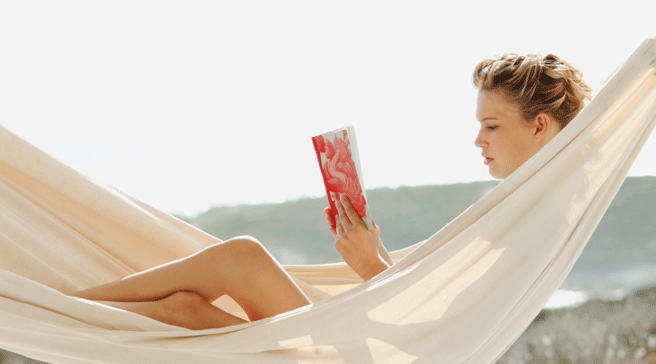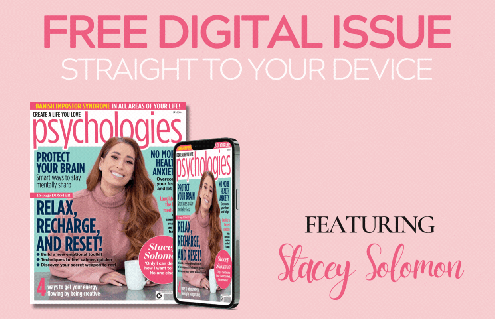Hold on to your holiday brain
We all know the bliss of taking time out from the daily grind, but is there a way to maximise the power of our ‘holiday brain’ and reap the benefits when we get home? By Sarah Maber

Waking up to sunshine and blue skies, a daily swim, reading an entire novel, lazing for hours outdoors and enjoying proper undistracted conversations with friends and partners – we all love being on holiday. Far from the stresses and hassles of everyday life, the rhythm of the day begins to meander rather than race, our anxieties fade and we find it easier to reconnect with those simple pleasures that our time-poor lives rarely afford. With plenty of time at your disposal, a holiday is not only a chance to relax, but also to gain a clear perspective on life that can enable change.
‘It’s an opportunity to plan your life, away from your life,’ says clinical psychologist Dr Cecilia d’Felice, author of 21 Days To A New You. ‘The change in tempo creates internal spaciousness. We can take stock, which is hard when life is so cluttered.’ But not everything about going on holiday is relaxing. In the lead-up, we’re likely to be rushing to finish work projects. Packing – particularly if we’ve got young children – is a challenge; the journey to the airport, with the possibility of delays, can be stressful; and once we land, there’s often a long drive from the airport to get to our final destination. It can also take a few days to adapt to a slower pace.
‘Holidays should be guilt-free time out from the worries that plague us at home,’ says psychologist and stress expert Felix Economakis. He observes that many of us feel intense pressure to make the holiday a success. ‘Most of us only get this opportunity once a year and so arrive at our destination determined to maximise it. You’re likely to feel quite stressed on arrival,’ says d’Felice. ‘You’ve got to allow yourself some transition time to unwind.’ She suggests forward planning to enable a holiday mindset to kick in quickly. Start in the weeks before you leave; make time for a lunchtime walk, and say no to extra work. ‘If you do these things before you go, you’ll establish a habit that you can continue on your return, prolonging that holiday spaciousness that is so helpful in keeping perspective,’ she says. ‘Establishing these habits as an essential part of our wellbeing package before our holiday is a good way of winding down, so we can hit the holiday in a good place.’
Alexandra Massey, life coach and author of Life’s A Beach: Keep That Holiday Feeling All Year Round, suggests splitting a holiday into two sections. ‘The first half is when you relax and let go. Your routine is broken, and your thinking becomes more flexible. You’re away from your life, so you can look back and see the whole vista – your work, where you live, your family and friends. ‘Now is the ideal time to take a look at your anxieties. How can you bring better balance to your life? Then, a few days before you go home, do some forward planning and set intentions; things you’d like to put in place when you’re home. At the end of your holiday, make a list of your priorities. You’ll see they’ve changed dramatically from your pre-holiday values and will have shifted towards simpler pleasures, such as spending time with friends or getting back to nature.’
Nurture a shift in thinking while you’re away and the pay-off could be far-reaching. ‘When you have some down time on the beach, think about all the things you don’t need; clutter from hobbies you no longer pursue or collections you no longer enjoy,’ says d’Felice. ‘Resolve to clear these things on your return so you clear the decks for new interests, pastimes and pursuits. Jot down what you notice about yourself and changes you’d like to make, paying attention to where you are wasting time and energy. The holiday mind can be like a new broom sweeping out the old and in the new.’
It’s easy to let good intentions slip when you get back home, however. With piles of post-holiday laundry, an inbox clogged with unread emails and the demands of work/family/friendships, it can feel impossible to stay focused on constructing the alternative reality you dreamed of on holiday. Within a few days, life can crowd in to such an extent that psychologists at the University of Granada have named it post-holiday syndrome. Symptoms include tiredness, aches, accelerated heartbeat, anxiety and sadness.
It’s crucial, therefore, to think of this return to normality not as a depressing step backwards, but as a real opportunity for change.
‘On holiday, it’s easy to see the vision of our future clearly,’ says Economakis. ‘And when you get home, it’s vital to keep up that holiday momentum. The people who realise their dreams just have more clarity about their goals – and more persistence in achieving them. So, however busy your life is, make a commitment to do a little bit towards your goal every day, whether it’s to write a novel, start your own business or retrain. Start to take your life seriously; this is your empire-building time.’
‘We pick up the trappings of our lives much more quickly than we let go of them,’ says d’Felice. ‘Once you’re home, get all your action points into your diary – if you want to work a four-day week, rather than five, plan that meeting with your boss. Notice the balance that you’ve achieved while on holiday, how you pace yourself and where your natural rhythm lies. Identify how you can reproduce this. Whether you are a night owl, or an early bird, arrange more complex tasks for when you are at your best and leave more mundane jobs for times when you are shining less brightly.’
Massey recommends a technique called anchoring to help you park worries and transport you back to the beach when you need a boost. ‘When you’re lying in the sun and in utter bliss,’ she says, ‘press your index finger and thumb firmly together to ‘anchor’ that feeling. Keep doing it throughout the holiday. Back home, your brain will be able to recall that feeling when you press your finger and thumb together, which can help calm you down and move you into that holiday headspace.’








